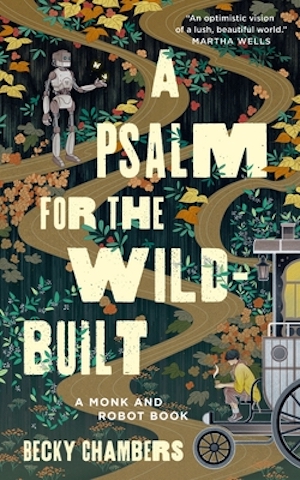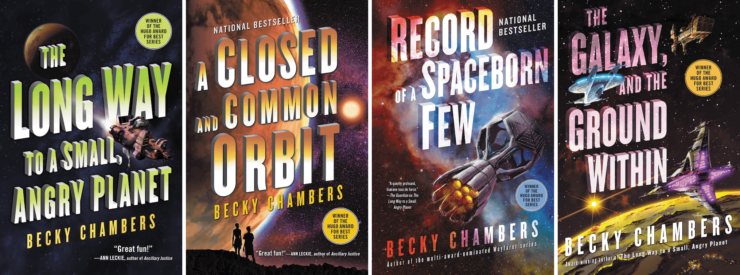Welcome, everyone, to a new year of Please Adapt, the column in which I pine for adaptations of my favorite sci-fi and fantasy books. I wrapped 2022 with an update on eight in-progress adaptations, but now we’re back to our regularly scheduled programming!
For me, 2022 was full of bookish highlights: I caught up on Brandon Sanderson’s Cosmere. I found a new favorite in Legends & Lattes. I read all of Neil Gaiman’s Sandman. And I finished Becky Chambers’ Wayfarer series.
Chambers has long been on my list of must-read authors. While I await her new books, I’ve been eagerly gobbling up the sci-fi goodness she’s already released. In 2022, Wayfarers was my comfort series. I came back to a new installment whenever I needed a known quantity, and Chambers’ hopeful futuristic science fiction more than fit the bill.
A compelling departure from any of sci-fi’s typical subgenres, Wayfarers plants humanity into a multi-species society far in the future and says “Go.” The four loosely-connected books contained within the series follow characters from myriad species and communities as they come to terms with their senses of identity and try to find their place in that endless universe. Chambers’ thoughtful, distinctive brand of science fiction makes Wayfarers a perfect choice for a limited streaming series.
The Story So Far
Wayfarers contains four novels:
- The Long Way to a Small, Angry Planet
- A Closed and Common Orbit
- Record of a Spaceborn Few
- The Galaxy, and the Ground Within
The series concluded with the fourth volume in 2021, and Chambers has focused on other projects (her Monk & Robot novella series is equally delightful). We thoroughly enjoyed the series over at The Quill To Live, and the sentiment seems to be fairly consistent throughout the SFF community. Folks love these books for their cozy-ish vibes, grounded characters, and imaginative sci-fi worlds—so much so that readers funded the first book via Kickstarter before Chambers locked in a publisher.
Buy the Book


A Psalm for the Wild-Built
I mention all this to assure you that Wayfarers is indeed worth the read, from beginning to end. If I can’t convince you, maybe Chambers’ multiple Hugo Awards can. I also say it to soften the blow, here, when I admit that an adaptation of the series seems highly unlikely (at least at the moment).
Chambers doesn’t have much of a social media presence (good for her), and her website focuses on (surprise!) books and in-person appearances. During my typical pre-writing “Please Adapt” research sift, I found no mention—not even a hint—that an adaptation of Wayfarers could be in the cards.
Do you think that’s gonna stop me from imagining what one would be like? Hell no. Wayfarers would be a fresh fit for streamers in this age of endless adaptation. Here’s why.
Humanity With a Capital H
In the world of Wayfarers, humans effectively destroy Earth and take to the stars in massive ark ships. Some live on the ships permanently, content to be space dwellers with their fellow humans. Others seek new pastures, venturing into the galaxy’s melting pot of planets. The galaxy is populated with countless species and cultures, each well defined by their own customs, behaviors, appearances, and attitudes.
Bear in mind that humanity’s exodus happens mostly off the page. Wayfarers follows characters, human or not, as they navigate this society. Over the years, it’s become the normal way of things. Each book features at least one human in some form, and while they serve as connective tissue for the reader, they’re far from the central focus of the series as a whole.
Instead, Chambers fleshes out her characters as people first, species second. We learn about the denizens of any number of planets or systems. The humans of Chambers’ sci-fi world ground us in the new while the narratives teach us about ourselves and others by offering glimpses of life outside of human experience.
In an adaptation, viewers could be treated to all the things that make the books special, plus visual imaginings of the various species we encounter as readers. These characters have the capacity to make us reflect on our own humanity just as they do for the human characters in the book.
And on a more superficial level, it would just be so cool to see a Harmagian or Aeluon depicted onscreen.
Love and Hope in Outer Space
I wouldn’t go so far as to call Wayfarers full-fledged “cozy” sci-fi. Shit definitely happens. Chambers’ characters live in war-torn regions, on dying planets, and in struggling ships. Hardship is part of life to them, but they cope. They hope. Chambers’ work has been dubbed “hopepunk” by many, and I think it’s a fitting label. Despite the turmoil of life in a galactic society, our characters seek ways to thrive among the stars.
Chambers delicately pulls at this thread in each book, even though every installment features a new cast (with some minor crossover in most cases). Captain Ashby aims to bring his tunneling crew’s morale to an all-time high while he juggles a difficult, long-distance interspecies relationship in The Long Way to a Small, Angry Planet. A Closed and Common Orbit sees an AI grapple with her identity when she is thrust into an unfamiliar and legitimately illegal form. Each book brings new philosophical questions to the table, and Chambers is as content to offer possible answers as she is to let those questions linger.
None of this is to say the books are devoid of action. As a TV show, Wayfarers could draw on a few key moments from the novels to spark heart-racing moments. However, I imagine that the show would primarily be an easygoing look at life in space through the interactions of the many characters. This brings us to the question of finding the right format…
A Closed Loop
Wayfarers is finished. The series concluded two years ago with the release of The Galaxy, and the Ground Within.
Is that reason enough for an adaptation? No. But for Wayfarers, I count it as a distinct positive. A savvy adapter could plot out a 12-episode anthology series, giving each book a three-episode arc. Release it in two parts. Or four! Let Wayfarers enter the zeitgeist and take its place among the best modern sci-fi stories adapted for screens.
Alas, this is not how “making money” works, and most studios would probably opt for a longer series with more earnings potential. But with the right minds behind the project, a Wayfarers series could make a splash in the same way the The Queen’s Gambit did, as a one-off, self-contained limited series. Launch, make a big impression, and exit stage left once the story has come to a close, remaining in the minds of viewers and readers for years to come as one of the greats.
Current Outlook: Middling At Best
The only reason I remain somewhat hopeful for an adaptation is Chambers’ ongoing success. Wayfarers won the Hugo for best series in 2019, following nominations for A Closed and Common Orbit and Record of A Spaceborn Few in years prior. The Galaxy, and the Ground Within would earn a nomination in 2021 as well.
Chambers’ other work is equally revered by critics and fans alike. She’s become one of the genre’s staples, releasing quality work at a steady clip. I rely on Chambers’ books for a healthy dose of uplifting and hopeful sci-fi each year. Should her success continue to grow (and I think it will), Hollywood might just take notice and pounce at the opportunity to adapt Chambers’ remarkable work. For now, happily, we have the books, and if you haven’t read them…now is the time.
Cole Rush writes words. A lot of them. For the most part, you can find those words at The Quill To Live or on Twitter @ColeRush1. He voraciously reads epic fantasy and science-fiction, seeking out stories of gargantuan proportions and devouring them with a bookwormish fervor. His favorite books are: The Divine Cities Series by Robert Jackson Bennett, The Long Way To A Small, Angry Planet by Becky Chambers, and The House in the Cerulean Sea by TJ Klune.










